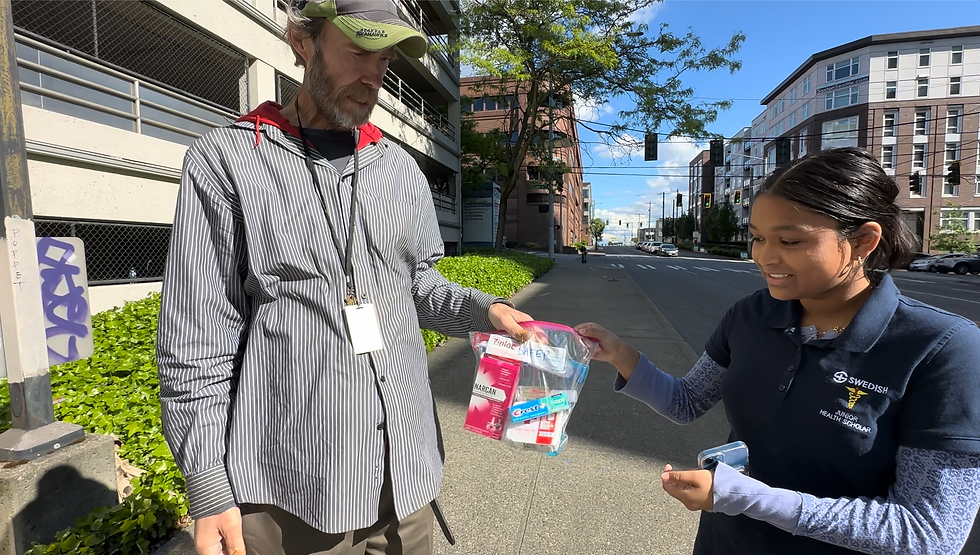Talk On The Street - 4
- jeslyn8
- May 22, 2024
- 3 min read
Updated: May 25, 2024
Jeslyn’s Encounter with Todd: A Person New to Narcan
In the latest installment of Talk On The Street, Jeslyn shared an insightful encounter with Todd, shedding light on both the critical challenges and potential solutions in the fight against the opioid crisis. This meeting underscores the importance of education, accessibility, and community involvement in addressing drug overdoses.
Todd's Harrowing Experiences with Overdose
Todd's experiences with overdoses are both personal and profoundly impactful. He recounted two separate occasions where he witnessed individuals succumb to drug overdoses. The first incident involved a close friend, while the second was a more distant acquaintance. In both cases, Todd was struck by the helplessness and finality of the situations, witnessing firsthand the fragility of life in the grip of substance abuse.
Additionally, Todd shared his own brush with overdose, which, unusually, involved marijuana. While marijuana overdoses are rarely fatal, his experience was a stark reminder of how substance use can spiral out of control. These encounters have made Todd acutely aware of the dangers associated with drug use, yet he felt powerless in the face of such emergencies.

Perceptions of Overdose and the Role of Emergency Services
Todd's insights into the behavior of drug users during overdoses are revealing. He noted that overdoses, while alarming, are often seen as an unfortunate but expected risk within drug-using communities. This normalization can lead to complacency, where the urgency of the situation is not fully recognized.
A significant concern Todd highlighted was the reluctance to call emergency services during an overdose. This hesitation can stem from various factors, including fear of legal repercussions, mistrust of law enforcement, and a lack of understanding about the critical timing needed for medical intervention. Todd's observations suggest that many overdoses go unreported, resulting in preventable deaths.
Introduction to Narcan: A Lifeline in Crisis
Despite his exposure to overdoses, Todd was unfamiliar with Narcan (naloxone), a life-saving medication that can reverse the effects of opioid overdoses. Jeslyn's introduction of Narcan to Todd was a pivotal moment. She explained that Narcan works by binding to opioid receptors in the brain, effectively reversing the respiratory depression caused by overdoses.
Jeslyn provided Todd with a Safer kit, which included Narcan and personal hygiene products. She demonstrated how to use Narcan, emphasizing the simplicity and effectiveness of the nasal spray form. This educational session not only empowered Todd with the knowledge to act in an emergency but also highlighted the importance of having Narcan readily available.
The Broader Implications: Education and Accessibility
Todd's story underscores a critical gap in public health education and resource distribution. Despite the widespread impact of the opioid crisis, many individuals like Todd remain unaware of life-saving tools like Narcan. This gap points to the need for more comprehensive education campaigns that reach those most at risk of encountering overdoses.
Moreover, accessibility to Narcan is crucial. Jeslyn's provision of the Safer kit to Todd is a model for community-based interventions. By distributing Narcan and ensuring that individuals are trained to use it, communities can create a network of first responders capable of saving lives.
Addressing the Reluctance to Seek Help
One of the significant barriers to effective overdose response is the reluctance to call emergency services. Addressing this issue requires a multifaceted approach:
Legal Protections: Implementing and promoting Good Samaritan laws that protect individuals from prosecution when they call for help during an overdose can alleviate fears of legal repercussions.
Trust Building: Building trust between communities and law enforcement through community policing and public health initiatives can encourage more people to seek help without fear.
Public Awareness Campaigns: Increasing awareness about the critical importance of timely medical intervention during overdoses can shift perceptions and encourage proactive responses.
Conclusion
Jeslyn's encounter with Todd, detailed in Talk On The Street - 4, highlights the urgent need for widespread Narcan education and distribution. Todd's personal experiences with overdose and his initial unfamiliarity with Narcan reflect a broader issue that many communities face. By equipping individuals with the knowledge and tools to respond to overdoses, we can save lives and make significant strides in combating the opioid crisis.
This story serves as a call to action for policymakers, healthcare providers, and community organizations to ensure that life-saving resources like Narcan are accessible and that the public is educated on how to use them effectively.




Comments